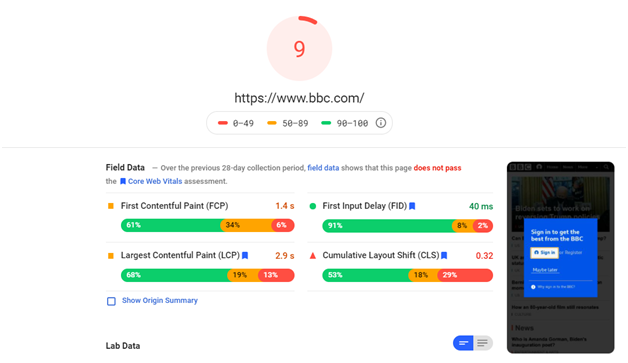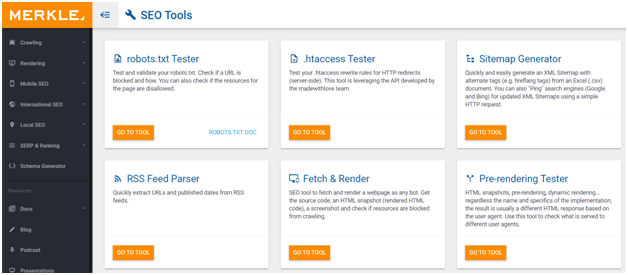With so many free SEO tools out there, how do you know which ones are right for your business? To save you time, upUgo has reviewed 20 that deserve a closer look.
PART 1 OF 4
Google’s free SEO tools
1. Page Speed Insights
If you’re looking for a free and simple way to check the speed and usability of your website across a range of devices, Google Speed Page Insights is one of the best free SEO tools out there.
To use Page Speed Insights, just enter the URL of your site. You’ll receive a report back with both lab and field data showing your loading time (on desktop and mobile), and will get an overall user experience score that tells you how well your website is performing.
The lab data is useful for identifying performance issues as it is collected in a controlled environment, however, it won’t capture real user issues. Field data, on the other hand, collects true, real-world user experiences, but has a limited set of metrics. It’s recommended to use both data sets to get an overall view of your performance.
Page Speed Insights will also work out whether your coding is inefficient, tell you if you have too many bulky images, and give you a list of opportunities to make your page load faster. As free SEO tools go, it’s a great way to work out the size and weight of your page – so you know what to change. Our page speed guide is a good place to start if you want to learn more about how to make improvements.

2. Google Search Console
Google Search Console is a must-have for any website owner. At the most basic level, it will send you notifications if your website is having security issues or pages drop out of Google search results.
Once set-up, you will also get valuable insight metrics to help you analyse your search traffic, understand how your site is performing, and iron out any issues that might be holding you back.
Google Search Console will:
- help you understand which search terms are used to visit your site analyse clicks, impressions, and position data;
- provide you with oversight of your index coverage and submit specific URLs and sitemaps to be crawled and indexed;
- Allow you to deal with identify issues by sending you an email alert when there’s a problem.
- Shows the external domains linking to your site and your most linked-to pages
- Provides you with Core Web Vitals data, showing which pages on your site are slow to load
And that’s not all. Google Search Console is packed with features designed to make your technical SEO easier – so take a closer look.
3. Google Analytics
One of the most recognised and widely-used free SEO tools in the digital space, Google Analytics works in harmony with Search Console, Optimize, and Data Studio.
Google Analytics will tell you how many users have visited your site, where in the world they are, whether your site’s mobile-friendly, and which of your online marketing tactics are most successful. In short, it’s an indispensable tool.
From an SEO perspective, our most commonly used features of Google Analytics are:
- Adding a segment to view all data at an organic search leve
- Comparing organic search metrics. vs. other channels
- Create goals to track the success of an SEO campaign
- Find top-performing landing pages
- Identifying redundant pages that could be optimised, removed, or consolidated to improve search performance
- See engagement metrics to understand how users are interacting with our content
- Adding the Keyword Hero view to see more keyword-level data for unbranded traffic
- Adding annotations to track changes and monitor the impact on organic performance
- The Content Drilldown report to look at how blog pages are performing
4. Chrome Dev Tools
With Chrome DevTools, you can perform a variety of important technical SEO tasks or audits directly in your Google Chrome Browser. Do you want to debug a page speed issue, audit your on-page SEO or inspect your code? No problem. All you need to do is visit the page you want to audit, right-click and select inspect element. From here, you can navigate the tabs and choose what you want to do.
For SEO, the key parts of DevTools, you’ll want to use are:
- Elements – review the code to analyse your on-page optimisation, such as metadata, canonical, and image alt tags.
- Device mode – emulate different mobile devices to see how responsive your web page is when viewed on a range of devices
- Lighthouse – generate a report to identify speed, accessibility, and simple SEO issues that could impact your performance or user experience
- Network – this is useful to identify render-blocking resources and filter at JavaScript and CSS level. These are resources loading before the DOM and potentially blocking it, slowing down your page speed
- Security – check the site has a valid HTTPS certificate and identify any security issues due to non-secure origins being used
Some of Chrome Dev Tools’ features are well hidden, but it’s worth persevering to reap the rewards. If you’re not a technical person, it’s probably not the tool for you, but if you work in SEO, there are so many useful features so it’s worth familiarising yourself with them.
5. Google Mobile-Friendly Test
Being mobile-friendly is an absolute must for websites. Google’s-Mobile Friendly test is one of the most simple and easy to use free SEO tools. Just simply paste the URL you want to check and click “test URL”. You’ll receive a short report that tells you whether or not your page is easy to use on a mobile device, and can view a screenshot of what it looks like The report also provides a list of page loading errors explaining any resources that have only loaded partially or failed to load. This information can be useful to pass onto a developer to investigate and fix.

6. Google My Business
If you’re a local business with a physical address or location then claiming and optimising your free Google My Business listing is a necessity. By doing this, you’ll be able to influence how you appear in Maps and Search – and even reply directly to customer reviews, enhancing your credibility.
For local-intent searches, the map pack displays above standard search results so optimising your GMB page is a huge opportunity for enhanced organic visibility.
Google My Business should form part of your marketing strategy if you’re serious about local-SEO. But it will only work if your NAP data (name, address, telephone number) is consistent across all channels – as Google will use this data to rank your listing.
To give you some guidance, here’s a list of top optimisations to make make the most of Google My Business:
- Reviews – make you actively respond and ask customers to leave reviews on your page
Business information – including opening/closing times, contact details, and your website URL - Posts – being active on your GMB can impact your rankings. Download the GMB app and post updates and offers on your page, just as you would on social media accounts
- Use your keywords – in your description, posts, and reviews. Although you can’t determine what customers write in a review, you could ask all customers that brought a certain product (keyword) to leave a review, which hopefully they’ll mention in the review.
- Add photos and videos – stand out from the competition with high-quality content that represents your company, team, and what you stand for
7. Link Review Generator
This free tool is linked to Google My Business. It lets you create a short and memorable link to use when interacting with customers on social media, via email, or any other viable media.
Google Link Review is easy to use. Access the ‘add profile short name option’ and submit your request. If the name’s already taken, experiment with variations until you find something memorable.
Once you’ve followed the steps above, you’ll be able to share your URL with customers. But remember to respond to all feedback (good and bad) if you want to build great brand credibility.
If you find you’re not getting many reviews, you could look to offer an incentive in return for a review.
Remember that reviews are a primary local SEO ranking factor, including the sentiment, keywords used, and the number of reviews. Google is also constantly experimenting with how reviews are displayed.
8. Google Trends
Is your content on-trend or have your customers shifted their interest elsewhere? Google Trends allows you to track how popular a topic or keyword is over a set period – so you don’t spend valuable time rewriting yesterday’s news.
Google Trends will help you to spot:
- Seasonal patterns – do certain topics or keywords spike at a specific time of year before dropping off?
- Topics that are in vogue right now – so your business can make the most of them
- Produce a content calendar – so you can write about the right topics at the right time
When using Google Trends, it’s worth remembering that it works differently from most keyword research tools. The graph that appears following your search does not represent actual search volume numbers, but rather an index ranging from 0 – 100. 100 is the highest peak in popularity of the query, whilst 50 means the term is half as popular. 0 suggests that there is insufficient data to provide demand statistics.

PART 2 OF 4
Free content planning tools
9. Alsoasked.com
Sometimes, scraping the surface of a topic isn’t enough. Your prospects might require more detail – which means you’ll need to uncover key subtopics and questions to gain their trust.
Writing a blog called ‘Choosing the best coffee capsule machine’ might not engage with your customers, who may want to know how to clean their equipment or which accessories to buy.
But how do you know what questions they’re asking? Alsoasked.com scrapes queries like these from Google’s People Also Ask (PAA boxes) – so all the hard work is done for you.
If you’re planning your content plan for the next few months, simply input one of your keywords into Alsoasked.com. It’ll give you a nice visual of the questions people ask to inform the titles and questions to include in your plan.
10. Ubersuggest
Are your customers reading your pages or engaging with your rival’s instead? Ubersuggest identifies high-ranking organic keyword phrases used by your competitors and tells you which ones are popular on sites like Facebook or LinkedIn.
Although Ubersuggest offers a paid subscription service and has daily limits, there are plenty of insights you can get for free:
- Review historical data to see how a keyword performed in previous months
- Identify new blog strategies using the built-in content ideas report based on content getting the most backlinks and social shares
- Enter a competitors URL to find out what keywords they’re ranking for and the content they are creating
Access several long-tail keyword ideas to inform your content creation plans.
11. Answer The Public
Answer The Public is your trusted spy in the digital space. It eavesdrops on key search data from search engines – which you can then tap into by entering the phrases or keywords your business is competing for.
This invaluable tool also provides automatic updates when trends change, so you can reform your strategy and stay on-trend. It’ll even suggest niche phrases and terms that you could use.
Answer The Public allows a total of 500K free searches a month. If you want unlimited searches, you’ll need to pay.
12. Copyscape
Is your copy being used without your consent? Have you accidentally duplicated a blog, article, or web-page on your site? Alternatively, you may have paid-for content that’s not the work of the person who submitted it.
Either way, duplicate content is bad for SEO. It could damage your reputation and adversely affect your rankings in the SERPs.
Copyscape is a free tool that has a built-in plagiarism checker that lets you search for duplicate content by typing a URL.
A premium version is available if you want to do more – like check multiple cases of plagiarism or audit up to 10,000 pages.
13. Grammarly
Anyone writing for the web should be using Grammarly. Simple, yet effective, it helps you identify and correct spelling, grammatical, and punctuation mistakes.
The great thing about this tool is that it doesn’t just let you know you’ve done something wrong, it also explains why and gives the advice to fix it. This is a helpful feature that is built into the free version.
With Grammarly, you can also add it to your Google Chrome extensions to ensure that everything you write or publish online is correct, whether that’s your website or social media page.
Once you get Grammarly, you’ll be surprised at how many mistakes you would usually make and not realise.
PART 3 OF 4
Backlinks
14. Moz Link Explorer
How do you know if your backlink profile is adversely affecting your SEO? Moz Link Explorer will check your site and provide you with information about your domain, page authority, follow/no follow ratio, and spam score.
You can also use Moz Link Explorer to analyse a competitor’s backlink profile and see how you compare – then tweak your SEO strategy to outrank them and win more business.
The free version of Moz Link Explorer lets you search for 10 domains per month, which can be useful if you don’t need to do this analysis daily. For additional searches and features, you’ll need to buy a subscription.
15. Neil Patel Backlinks
With this free backlink checker, all you need to do is enter your competitor’s URL to find out who’s linking to them but not you. This can help you to identify opportunities and new ways to improve your online rankings.
This simple but effective tool shows:
- The types of backlinks they have – such as .edu or .gov;
- how many links your competitors have versus yours;
- how many of those referring domains are unique.
- The specific sites and pages linking
While there are several free backlink tools available, there’s no guarantee they’ll show all of your or your competitor’s backlinks. We’d recommend using a range of free tools, including Google Search Console’s “Links” section. If you work in SEO, PR, or outreach, you’ll probably want to pay for a tool, such as Majestic, BuzzSumo, or Ahrefs to find additional links and insights.
PART 4 OF 4
Technical SEO tools
16. Merkle Technical Tools
Merkle Technical Tools is a suite of tools to help with technical SEO. Many of these tools are available elsewhere, but Merkle has put them all in one dashboard, making it an easy go-to tool for technical checks. The most useful tools to use are:
- Sitemap generator – create a sitemap to submit in Google Search Console
- Schema generator – no coding skills required, simply choose the schema, input the requested information and you’ll be able to download a file with the code to handover an SEO team to a developer to upload to your site
- Robots txt tester – enter a website URL to check whether certain pages are being blocked from being shown in search results
You’ll need a reasonable understanding of basic SEO to explore Merkle’s range of tools, but why not head over to their website and give them a go?

17. Screaming Frog
Screaming Frog is a tool that crawls websites and extracts data to determine the technical health of a website. It can be used for several checks, including finding broken links, analysing on-page optimisation, identifying duplicate content, and much more.
This powerful tool can assess sites of any size faster than your team could manually – and without the risk of key findings being missed.
You can crawl 500 URLs in one fell swoop with Screaming Frog which is perfect if you’re analysing a small website. For anything else, you’ll need to buy a licence.
It’s a desktop tool so you’ll need to download and install it before you can start crawling.
18. Smush
Ensuring your images are optimised is important if you want to avoid slow load times and a poor user experience. Smush is an online compression tool that makes your images smaller – and therefore quicker for users to download.
Site speed is a ranking factor too, so using a simple tool like Smush to simply optimise your images is a quick win as far as SEO goes.
Smush easily integrates with WordPress to improve your site’s performance and deliver a better overall user experience. The key benefit of Smush is that you can request that your images are automatically compressed once uploaded. This reduces the need to go back, compress and reupload them at a later date. Alternatively, you can also compress 50 images in the one go using the smush in bulk option
Although Smush is 100% free, you can only use lossless compression and image sizes are limited to 1MB. There are many more options with the pro paid version, which could be worth exploring too.
19. Yoast SEO
If you’re a WordPress user add the Yoast SEO plug-in to your site. The free version comes with a range of essential on-page optimisation features – including adding metadata, automatic warnings about outdated posts, a readability checker, and the ability to mark links as no-follow or sponsored while writing.
Yoast can also be used to automatically generate your sitemap, add structured data, and link up your site to Google Search Console.
Be aware that limitations apply to some of the free features. For example, you’ll only get 10 related keyword phrases a day and the built-in preview feature only shows the Google view.
More advanced options – like internal linking features – are available on a paid subscription.
20. GTmetrix
If you’re not sure why your site is slow, or want to explore new optimisation opportunities, GTmetrix deserves a closer look. It lets you test your pages using different browsers, connections speeds, and in any country.
You can use the basic version of GTmetrix for free. But if you want to change your screen resolution, create presets, edit user agent strings, or create a custom DNS, you’ll have to sign up for the Pro version.
Choose NMG for your next project
With a deep understanding of the best SEO tools and extensive omnichannel experience, upUgo has the technical know-how to help your business succeed online. Contact our team for an informal chat.
THE COMPLETE GUIDE
In this series we’ll show you to create a comprehensive SEO strategy, tackling core ranking factors across all aspects of SEO. We’ll help you build a tailor-made strategy that’s right for your business and build the confidence you need to push your business to the next level.
ON PAGE SEO
Chapter one
OFF-SITE SEO
Chapter two
TECHNICAL SE0
Chapter three
ANALYSIS
Chapter four
Want to know more about how SEO can help your business?
Reach out to one of our team to find out we can help you achieve your goals.
Make an enquiryLETS GET YOU STARTED
What can we help you with? (Choose up to 3)